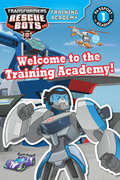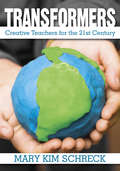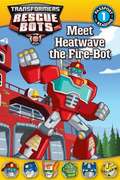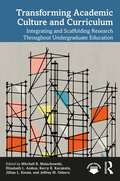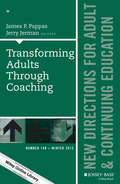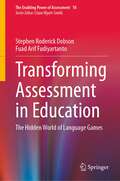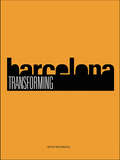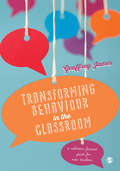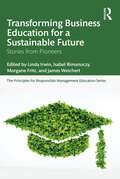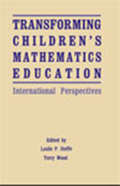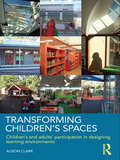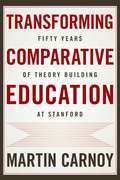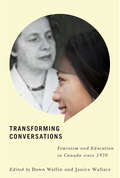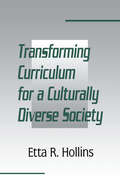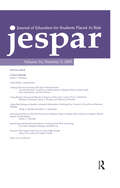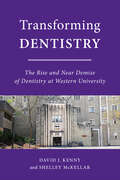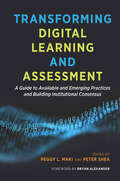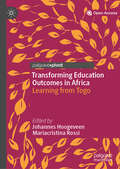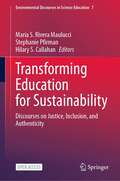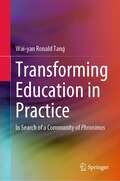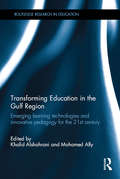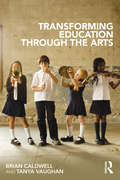- Table View
- List View
Transformers Rescue Bots: Welcome to the Training Academy!
by Justus LeeThe Transformers Rescue Bots are ready to help the people of Griffin Rock in this brand new level-1 reader!The Rescue Bots have a great new home base until the computer goes haywire. Can the team work together to fix it, or will their new Training Academy be discovered?Passport to Reading Level 1©2017 Hasbro. All Rights Reserved.
Transformers: Creative Teachers for the 21st Century
by Mary K. SchreckPacked with research-based strategies, this step-by-step resource shows educators how to cultivate a more creative teaching practice by accessing their creative resources, eliciting students' creativity, and more.
Transformers: Meet Chase the Police-Bot
by Lisa SheaOptimus Prime has selected a special team of Transformers to work side-by-side with the people of Earth--they are called the Rescue Bots! Chase the Police-Bot changes into a police car and is partnered with Chief Charlie Burns. Together they're unstoppable!A Passport to Reading Level 1 book.
Transformers: Meet Heatwave the Fire-Bot
by Lisa SheaOptimus Prime has selected a special team of Transformers to work side-by-side with the people of Earth--they are called the Rescue Bots! Heatwave the Fire-Bot changes into a fire engine and is partnered with Kade Burns. In this story, the Rescue Bots have to stop some runaway floating lobsters from ruining the town parade!A Passport to Reading Level 1 book.
Transforming Academic Culture and Curriculum: Integrating and Scaffolding Research Throughout Undergraduate Education
by Mitchell R. MalachowskiInstitutions across the higher education landscape vary, and each navigates change in its own way. This volume describes how institutions and departments influence the success of structural and cultural transformations to advance curricular reform.A product of the Council on Undergraduate Research Transformations project, a six-year, longitudinal research study funded by the United States National Science Foundation, this text features the goals, strategies, and outcomes that evolved from the experiences at 12 diverse colleges and universities in creating innovative undergraduate curricula and campus cultures that maximize student success. With the goal of achieving departmental transformations in both student learning and academic culture – by backward-designing and scaffolding research into and across undergraduate curricula – editors include scholarly findings, step-by-step guides, and a toolkit section, with plentiful online resources, to help readers develop and execute personalized change processes on their own campuses.Designed to span both theory and practice for departments and institutions to transform undergraduate education to increase student success, this book is vital for all higher education scholars, practitioners, faculty, staff, and leaders interested in creating research-rich curricula and change more broadly.Visit the Council on Undergraduate Research website here: https://www.cur.org/.
Transforming Adults Through Coaching: New Directions For Adult And Continuing Education (J-B ACE Single Issue Adult & Continuing Education)
by James P. Pappas Jerry JermanThe field of coaching adult populations has grown dramatically over the past two decades. This volume brings together coaching scholars and experts to review this trend, examine some of the theoretical foundations of the field, and explore how coaching adults manifests itself in the workplace, at executive levels, and in educational and nonprofit organizations. Readers will: Gain understanding of this field of coaching adult audiences, Learn how adult development and adult learning theories undergird this work, and See applications of coaching approaches through numerous case studies. This is the 148th volume of the Jossey Bass series New Directions for Adult and Continuing Education. Noted for its depth of coverage, it explores issues of common interest to instructors, administrators, counselors, and policymakers in a broad range of education settings, such as colleges and universities, extension programs, businesses, libraries, and museums. This is the 148th volume of the Jossey Bass series New Directions for Adult and Continuing Education. Noted for its depth of coverage, it explores issues of common interest to instructors, administrators, counselors, and policymakers in a broad range of education settings, such as colleges and universities, extension programs, businesses, libraries, and museums.
Transforming Assessment in Education: The Hidden World of Language Games (The Enabling Power of Assessment #10)
by Stephen Roderick Dobson Fuad Arif FudiyartantoThis book transforms our current understanding of assessment practice in different educational settings and cultures. Drawing upon the resources of language games and critical realism the authors argue for an innovative engagement with the philosophical, theoretical and practical foundations of assessment. What is the connection between learning, motivation and assessment? Is assessment for learning a motorway or a blind alley for improved learning outcomes? How can creativity be assessed through the eyes of the connoisseur? How can assessment cultures be understood as forms of life and language games? Do new forms of society transform our assessment practices? A critical appreciation of the work of Royce Sadler is offered for assessment specialists.
Transforming Barcelona: The Renewal of a European Metropolis
by Tim MarshallThis unique book, written by local experts in the city, deals with the transformation of Barcelona during the last twenty years. Barcelona has been held up as a model of urban planning and economic regeneration amongst built environment professionals. The redesign of square parks and streets throughout the city in the 1980s first attracted attention and praise and then the 1992 Olympics hosted in the city raised international awareness. The city received many awards and accolades including a Gold Medal from the RIBA. The selection of writings is well illustrated throughout with maps, drawings and photographs and will be of interest to architects, planners and urban designers as well as those interested in the social and economic impacts of regeneration.
Transforming Behaviour in the Classroom: A solution-focused guide for new teachers
by Dr Geoffrey JamesBeing able to effectively manage the behaviour in your classroom is one of the basic foundations of good teaching. However creating a positive productive learning environment is challenging as the causes of behavioural issues can be complex and difficult to identify. This book presents a solution-focused approach to behaviour management in primary and secondary schools, starting with the child and offering a flexible methodology and practical strategies for facilitating long-term positive behaviour. Key coverage includes: • An overview of main approaches to behaviour management drawing from educational theory and research • Case studies throughout the book exploring key strategies and issues • How to develop confidence in the classroom as a new teacher • Neuroscience and behaviour: what can we learn from recent scientific discoveries?
Transforming Behaviour in the Classroom: A solution-focused guide for new teachers
by Geoffrey JamesBeing able to effectively manage the behaviour in your classroom is one of the basic foundations of good teaching. However creating a positive productive learning environment is challenging as the causes of behavioural issues can be complex and difficult to identify. This book presents a solution-focused approach to behaviour management in primary and secondary schools, starting with the child and offering a flexible methodology and practical strategies for facilitating long-term positive behaviour. Key coverage includes: • An overview of main approaches to behaviour management drawing from educational theory and research • Case studies throughout the book exploring key strategies and issues • How to develop confidence in the classroom as a new teacher • Neuroscience and behaviour: what can we learn from recent scientific discoveries?
Transforming Business Education for a Sustainable Future: Stories from Pioneers (The Principles for Responsible Management Education Series)
by Isabel Rimanoczy Linda Irwin Morgane Fritz James WeichertAs the impact of climate change becomes more evident and dire, business leaders, educators, students, and academic leaders are deciding what they need to change and do to survive and thrive in a new and dramatically different environment. This book sets out how to transform business education and integrate sustainability practices into curriculum and a wider academic culture. While some universities around the globe are still teaching business practices that have contributed to human and environmental crises, pioneering educators and higher education institutions are researching, developing, and implementing programs to transform business education and practices. With stories from 26 administrators, researchers, and faculty across the globe, this book inspires business educators with innovative tools and creative solutions to address challenges in the business world and society. These pioneers are helping students and business ventures change the way they conduct business to survive and thrive in a fast-changing global environment. Their unique and personal journeys offer tools, models, lessons-learned, and inspiration for change. The book will both inspire and guide faculty members, administrators, students, and alumni to transform business education for a sustainable future.
Transforming Children's Mathematics Education: International Perspectives
by Rupert A. CoxEminent scholars from around the globe gathered to discuss how educational systems would change if the prevailing principles of constructivism were applied to three major aspects of those systems -- knowledge and learning, communication, and environment. This volume provides documentation of the proceedings of this important meeting - - the Early Childhood Action Group of the Sixth International Congress on Mathematics Education. This international assembly, representing such diverse disciplines as mathematics and math education, epistemology, philosophy, cognitive science, psycholinguistics, and science education, is the first to examine early childhood mathematics education from constructivist and international perspectives in addition to formulating recommendations for future work in the field.
Transforming Children's Spaces: Children's and Adults' Participation in Designing Learning Environments
by Alison ClarkHow can young children play an active role in developing the design of learning environments? What methods can be used to bring together children’s and practitioners’ views about their environment? What insights can young children offer into good designs for these children’s spaces? With the expansion of early childhood education and the move to 'extended schools', more young children will spend more time than ever before in institutions. Based on two actual building projects, this book is the first of its kind to demonstrate the possibilities of including young children’s perspectives in the design and review of children’s spaces. Situated at the heart of the debate about the relationship between the built environment and its impact on children’s learning and wellbeing, Transforming Children’s Spaces provides insights into how young children see their environment discusses children’s aspirations for future spaces develops the 'Mosaic approach' , pioneered by the author, as a method for listening to young children and adults Emphasising the importance of visual and verbal methods of communication, this fascinating book demonstrates how practitioners and young children can articulate their perspectives, and shows how participatory methods can support new relationships between children, practitioners and architects. This book is essential reading for those who work in children's spaces and for those who design them as well as being of general interest to those studying education and childhood studies.
Transforming Classroom Culture
by Arlene Dallalfar Esther Kingston-Mann Tim SieberAn anthology of original work authored by diverse faculty who work in a variety of New England college and university settings - private and public, racially homogeneous and diverse - this book focuses on institutional contexts that promote innovation in teaching practice, faculty identity as a resource for effective pedagogy, and dilemmas and outcomes of student-faculty engagement in the classroom.
Transforming Comparative Education: Fifty Years of Theory Building at Stanford
by Martin CarnoyOver the past fifty years, new theoretical approaches to comparative and international education have transformed it as an academic field. We know that fields of research are often shaped by "collectives" of researchers and students converging at auspicious times throughout history. Part institutional memoir and part intellectual history, Transforming Comparative Education takes the Stanford "collective" as a framework for discussing major trends and contributions to the field from the early 1960s to the present day, and beyond. Carnoy draws on interviews with researchers at Stanford to present the genesis of their key theoretical findings in their own words. Moving through them chronologically, Carnoy situates each work within its historical context, and argues that comparative education is strongly influenced by its economic and political environment. Ultimately, he discusses the potential influence of feminist theory, organizational theory, impact evaluation, world society theory, and state theory on comparative work in the future, and the political and economic changes that might inspire new directions in the field.
Transforming Conversations: Feminism and Education in Canada since 1970
by Dawn Wallin Janice WallaceWhat effect has feminism had on Canadian education since the 1970 Royal Commission on the Status of Women, and to what end? Transforming Conversations explores post-commission feminist thought and action in the contexts of primary, secondary, post-secondary, and adult education. In this volume, teachers, professors, and educational administrators – many trailblazers themselves – document the historical experiences and outcomes of feminist action in university faculties of education, departments of educational administration, academic and professional societies, teachers’ unions, and community groups over the past five decades. They begin by exploring liberal feminism as an initial response to the historical context in which female educators spoke up for women’s rights and reshaped formal education systems. The contributors further explore how feminist theory was reconceptualized as women moved into formal leadership roles across education sectors. Last, contributors consider female educators at the intersection of gender and other systems of exclusion, such as race and class, despite ostensibly inclusive feminist theory that continues to be bounded by Western, colonial, neoliberal ideologies. Transforming Conversations considers the complex effects feminism has had and continues to have on Canadian education, acknowledges voices that have been marginalized, and invites readers to continue a transformative feminist dialogue.
Transforming Curriculum for A Culturally Diverse Society
by Etta R. HollinsThe intention of this book is to engage educators in transforming the public school curriculum for a culturally diverse society. This means more than including knowledge about diverse populations. It means reconceptualizing school practices through debate, deliberation, and collaboration involving the diverse voices that comprise the nation. Certain key questions must be addressed in this process: * What should be the purpose of schooling in a culturally diverse society? * Who should be involved in curriculum planning and what process should be employed? * How is the actualized curriculum differentiated? * What is the relationship between school practices and the structure of the larger society? * How should the curriculum be evaluated? The authors of the essays in this book address critical perspectives from which a framework is constructed for a discourse on planning curriculum for a culturally diverse society. In a substantive introduction, Hollins presents the major themes and overall goals of the book and describes how the readings in each of the four parts are linked to each other and to these themes and goals. Each part begins with critical questions and an overview to provide a framework and a focus for the readings that follow, and concludes with suggested learning experiences.
Transforming Data Into Knowledge: Applications of Data-based Decision Making To Improve Instructional Practice:a Special Issue of the journal of Education for Students Placed at Risk
by Jeffrey C. WaymanThis Special Issue includes works on linking data and learning, using student-assessment results, data mining, data decision making for teachers, identifying student's needs with technology and data use in urban high schools. The goals of the Journal of Education for Students Placed At Risk (JESPAR) are to provide the best research-based information possible to professionals involved with improving the education of students placed at risk and to promote the use of that information through effective communications among researchers, policymakers, and practitioners in the field. JESPAR publishes articles geared to academic researchers, policy analysts, and especially to practitioners regarding practical, research-based progress in the field of education for students placed at risk. The journal offers refereed research articles on promising programs; descriptions of promising programs in the field; case studies of schools that work; literature reviews; book and report reviews; regular communications on Title I regulations; and school and district practices from federal, state, and local perspectives.
Transforming Dentistry: The Rise and Near Demise of Dentistry at Western University
by Shelley McKellar David J. KennyThe history of the dental program at Western University is a spirited and gritty story of grand visions, strong personalities, and contentious leadership. Focusing on the years from 1965 to 2015, Transforming Dentistry highlights Western University’s ambitious plans to create and situate a dental program within a health sciences complex; the practical challenges involved in implementing a curriculum and populating a new school; the influence of key dental faculty, community dentists, and students in shaping the program; and the school’s near closure during the 1990s. David J. Kenny and Shelley McKellar detail how and why the training of dentists was transformed by science, technology, and individual educators. The book focuses on the unique aspects of Western’s dental program and compares it with the programs offered at nine other Canadian schools. Today, the strong reputation of Western dentistry is a direct result of the ambitious visions, professional commitment, and steadfast leadership employed by London dentists and university educators over more than five decades.
Transforming Digital Learning and Assessment: A Guide to Available and Emerging Practices and Building Institutional Consensus
by Bryan Alexander Peggy L. Maki Peter SheaResponding to both the trend towards increasing online enrollments as the demand for face-to-face education declines, and to the immediate surge in remote learning owing to the COVID-19 pandemic, this book provides vital guidance to higher education institutions on how to develop faculty capacity to teach online and to leverage the affordances of an ever-increasing array of new and emerging learning technologies.This book provides higher education leaders with the context they need to position their institutions in the changing online environment, and with guidance to build support in a period of transition.It is intended for campus leaders and administrators who work with campus teams charged with identifying learning technologies to meet an agreed upon program- or institution-level educational needs; for those coordinating across campus to build consensus on implementing online strategies; and for instructional designers, faculty developers and assessment directors who assist departments and faculty effectively integrate learning technologies into their courses and programs. It will also appeal to faculty who take an active interest in improving online teaching.The contributors to this volume describe the potential of artificial intelligence algorithms, such as those that fuel learning analytics software that mines LMS data to enable faculty to quickly and efficiently assess individual students’ progress in real time, prompting either individual attention or the need to more generally clarify concepts for the class as whole. They describe and provide access to a hybrid professional development MOOC and an associated WIKI that curate information about a wide range of learning software solutions currently available; and present case studies that offer guidance on building the buy-in and consensus needed to successfully integrate learning technologies into course, program- and institution-level contexts.In sum, this book provides readers with a comprehensive understanding of the technological capabilities available to them and identifies collaborative processes related to engaging and building institutional support for the changes needed to provide the rapidly growing demand for effective and evidence-based online learning.
Transforming Education Outcomes in Africa: Learning from Togo
by Mariacristina Rossi Johannes HoogeveenGood education changes lives. It is therefore unsurprising that improved schooling plays a central part in most development strategies. At the same time, the expansion of school attainment alone is not sufficient to guarantee improved welfare. This book focuses on one country in West Africa, Togo, to explore what a country that has successfully increased enrollment rates can do to enhance learning outcomes. The authors explore different avenues for improvement, including enhancing the efficiency with which resources are used; increasing the qualifications of teachers; and through greater community involvement in school management. There is scope for improvement along all these dimensions, yet changes at the margin are insufficient to bring about the transformation needed to bring about acceptable levels of learning.Important reading for anyone interested in understanding the pathways to improving the education system in Togo and other developing countries.
Transforming Education for Sustainability: Discourses on Justice, Inclusion, and Authenticity (Environmental Discourses in Science Education #7)
by María S. Rivera Maulucci Stephanie Pfirman Hilary S. CallahanThis book investigates how educators and researchers in the sciences, social sciences, and the arts, connect concepts of sustainability to work in their fields of study and in the classrooms where they teach the next generation. Sustainability, with a focus on justice, authenticity and inclusivity, can be integrated into many different courses or disciplines even if it is beyond their historical focus. The narratives describe sustainability education in the classroom, the laboratory, and the field (broadly defined) and how the authors navigate the complexities of particular sustainability issues, such as climate change, water quality, soil health, biodiversity, resource use, and education in authentic ways that convey their complexity, the sociopolitical context, and their hopes for the future. The chapters explore how faculty engage students in learning about sustainability and the ways in which working at the edge of what we know about sustainability can be a significant source of engagement, motivation, and challenge. The authors discuss how they create learning experiences that foster democratic practices in which students are not just following protocols, but have a stake in creative decision-making, collecting and analysing data, and posing authentic questions. They also describe what happens when students are not just passively receiving information, but actively analysing, debating, dialoguing, arguing from evidence, and constructing nuanced understandings of complex socioscientific sustainability issues. The narratives include undergraduate student perspectives on what it means to engage in sustainability research and learning, how students navigate the complexities and contradictions inherent in sustainability issues, what makes for authentic, empowering learning experiences, and how students are encouraged to persevere in the field.This is an open access book.
Transforming Education in Practice: In Search of a Community of Phronimos
by Wai-yan Ronald TangThis book inspires educational practitioners with special regard to the way how practice in the frontline service is able to inform leadership and policy decision. It empowers them to identify what features are counted as professional and how they could be turned into sources for developing wise judgment and eliciting creative acts in teaching, lesson planning and course design, collaboration, and knowledge excavation to shape policy decision and planning. In addition, for those who are used to conceive the world and their practice from a positivist tradition may find the insights of this book illuminating particularly when they are looking for a paradigm shift in understanding their practice. Last but not least, educators and teacher educators in particular will find the ideas in this book more promising in escalating the awareness of teachers of the next generation towards what is ‘good’ (phronesis) in terms of their professional attitude and actual performance (informed by both techne and episteme) in their relevant settings.
Transforming Education in the Gulf Region: Emerging Learning Technologies and Innovative Pedagogy for the 21st Century (Routledge Research in Education)
by Mohamed Ally Khalid AlshahraniCountries in the Arab Gulf are currently experiencing some of the fastest rates of growth and progress in the world. Transforming Education in the Gulf Region argues that education systems in these countries need to use innovative pedagogies and best practices in teaching and learning to educate all citizens so that they obtain the knowledge and skills to be productive members of society. This book will contribute to the transformation of education in the Gulf countries by suggesting best practices, research outcomes and case studies from experts in the Gulf region. It has become increasingly evident in recent years that Gulf countries need to use emerging learning technologies to cater for the needs of learners and to provide maximum flexibility in learning. There is also a growing practical need to use electronic technologies, since learning materials are more widely available in electronic formats than in paper-based formats. This book focuses on the role of emerging technologies and innovative pedagogies in transforming education in six Gulf countries in the region (Saudi Arabia, United Arab Emirates, Kuwait, Qatar, Oman and Bahrain). With contributions from experts around the world, the book argues that the time is right for Arab Gulf countries to make the transition to electronic learning and that they need to implement the outcomes of research and adopt best practices to transform and revolutionize education to prepare learners in the Gulf region for the 21st Century. The book should be of interest to academics and students in the areas of higher education, learning technologies, education policy and education reform. It should also be of interest to educators and policymakers in the Gulf region.
Transforming Education through the Arts
by Brian Caldwell Tanya VaughanThis timely book takes up the challenge of maintaining programs in the arts in the face of unrelenting pressure from two directions; the increasing focus on literacy and numeracy in schools, teamed with the cut-backs in public funding that often affect the arts most severely. Drawing on the wealth of evidence already available on the impact of the
